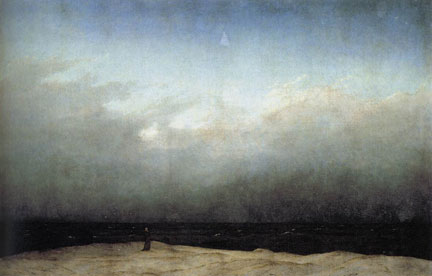
"Well then, my fine friend," said Mr. C..., "you now have all the knowledge you need to grasp my meaning. We see that in the organic world, to the same degree that reflection gets darker and weaker, grace grows ever more radiant and dominant. But just as two lines interesect on one side of a point, and after passing through infinity, suddenly come together again on the other side; or the image in a concave mirror suddenly reappears before us after drawing away into the infinite distance, so too, does grace return once perception, as it were, has traversed the infinite -- such that it simultaneously appears the purest in human bodily structures that are either devoid of consciousness or which possess an infinite consciousness, such as in the jointed manikin or the god."
"In which case," I observed, a bit befuddled, "would we then have to eat of the fruit of the tree of knowledge again to fall back into the state of innocence?"
"Undoubtedly," he replied; "which will be the last chapter of the history of the world."
"On the Theater of Marionettes," Heinrich von Kleist
On this remarkable account, humanity is an awkward absurdity as compared to the infinite grace of an unself-conscious plant. And yet humanity is redeemed by the possibility that it is in fact a point of transit on the way to something else, something infinitely better.
After a promisingly ingenious career, Kleist committed suicide in 1811 at the age of 34; what a disjunction between the life and the work. And yet the fact that any thumbnail sketch of him mentions the nature of his demise speaks volumes about the unique place of psychiatry. Whether a genius dies of leukemia, congestive heart failure, or tuberculosis we really couldn't care less. But suicide bespeaks far more than mere failure of the flesh, it suggests a moral claim, and a moral act with profound social implications. Just as social withdrawal implies a rejection of others, so suicide implies...a murdering of the human race. Killing oneself makes the rest of the human world disappear from consciousness too. That is why we view the suicide not only with pity, but also with consternation.
(It has been a fine day actually; this post just happened to strike me).
1 comment:
Good post! What an interesting quote. I had never heard of Kleist. Will have to go find more of him.
So much one could say on your topic. Although one is sympathetic to the real agonies of the suicidal, the havoc the act wreaks on the survivors is unspeakable. The higher rate of completed suicide in surviving children. The misery and rage of loved ones bereaved. Not just self murder, but a murder of love. Perhaps it was this, more than it supposedly being the ultimate sin (to deny the providence and mercy of God), that led people to treat it as a crime, and to refuse to bury the suicide in hallowed ground. We rightly consider this cruel. But perhaps the intent was deterrence. Given the terrible toll it takes on those left behind.
Also, from having watched and tried to keep self-destructive loved ones safe (when insurance companies say a person can't stay in the hospital any more but they are still in trouble),the constant fear of the person completing the act can mean the slow death of hope, love, and trust in a family. If every time one leaves the person alone, one is afraid what one will find upon returning, one gets angry, fed up, and the world begins to seem absurd, capricious.
When a creative person commits suicide, it also can cause all their work to be seen thru the lens of their death. What a waste. If a person had a glimpse of God, or a poetic vision, or some hopeful message, their readers will say "That and a dollar..."knowing how badly the person's life ended.
Post a Comment